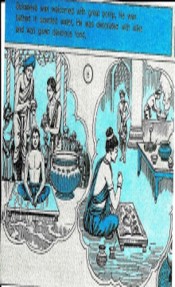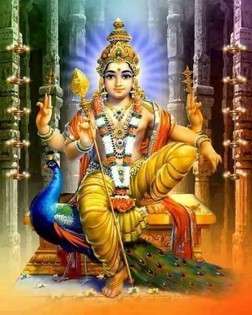Talk:Destruction of Prārabdha Karm by Bhakti Yog
By Vishal Agarwal
A Bhakta surrenders himself completely to the Īshvara. As his mind, intellect, and body are completely immersed in Bhagavān, he does not feel the results of any adverse Prārabdha, nor does he exult after any worldly gain.
Story: Swami Ramakrishna Paramahamsa Accepts his Death as a Gift of Mother Kali
Swami Ramakrishna Paramahamsa was one of the greatest devotees of Mother Kali. He treated Kali as her real mother. He went to Her temples and sang in front of Her mūrti, and spoke to Her, cried in front of Her, just like a child behaves towards his mother. In his later years of life, Ramakrishna Paramahamsa himself fell very sick. The doctors said that he has throat cancer and that he will not live very long. The disciples and other admirers of Ramakrishna were shocked. They could not believe that a saint like him could die of cancer. Therefore, they approached the saint and pleaded, “You say that Kali is like your mother. Why don’t you ask her to cure your cancer? She will surely listen to the request of a saint like you, who is also her dear son.” Ramakrishna said that he did not want to ask his Mother Kali for anything. But
Ramakrishna’s disciples continued to pressure him. Therefore, the saint finally agreed and prayed to Mother Kali. The next day, the disciples approached Ramakrishna eagerly and asked him, ‘Swamiji, did you ask Ma Kali to cure you?” The saint replied and said, “Yes, I asked her to cure my cancer. But she replied – “Why do you ask me for such a trivial thing? Your body will die one day anyway. Ask for something more valuable.” So, I felt ashamed and asked her that I should always live at her feet. I asked her to make sure that I always remain her devotee.”
When the disciples heard Ramakrishna say these words, they wept. They knew that their Guru would soon die. But they felt happy and blessed that they were looking at a great saint who valued bhakti for Ma Kali more than his own life!
There are numerous stories of how Bhaktas have even overcome their Prārabdha dependent disabilities through Divine intervention-
The Mercy of Bhagavān Kārttikeya on Alagumuttu Pulavar
More than 200 years ago, in the Karttikeya Mandir at Nagai, there worked an accountant named Alagumuttu. He was a great devotee of Karttikeya. Every night, after his work was done, he took a little prasāda from the Mandir and then went to sleep without eating any dinner. One night, he went to the Mandir for the evening worship and fell asleep there without eating anything. Late in the night, when he woke up, he discovered that he was now locked inside. He was feeling hungry, but there was no food and no one to get him out of the Mandir. He prayed to Bhagavān Karttikeya to rescue him. Suddenly, a priest appeared with some food for him. Alagumuttu ate hungrily and then thanked the priest.
Then, the priest asked Alagumuttu to sing a religious song in praise of Karttikeya. But he replied, “I do not know how to sing. Also, I do not know any songs to praise Karttikeya. I am not very well educated, so please do not ask me to write any new song either.” But the priest insisted. When Alagumuttu tried to sing, he was surprised to see that all of a sudden, he could sing very beautifully. And not only that, but he could also sing songs that no one had ever taught him. Alagumuttu was surprised and asked the priest, “What did you mix in the food? And who are you? How did I become so intelligent and so good a singer suddenly?” The priest revealed his form – he was none other than Karttikeya. Bhagavān Karttikeya then said, “I am very pleased with the love that you have for me. Therefore, I am gifting you the ability to sing beautiful songs to me in the Mandir and also the ability to write new songs very fast.”
The next morning, when the priests opened the door, they noticed a light on the face of Alagumuttu. They realized that something very good had happened inside the Mandir the last night. Suddenly, Alagumuttu started to sing a prayer to Karttikeya. Everyone was surprised to see that an accountant who had not studied much and could not sing was now singing prayers to Karttikeya so beautifully. This change was a blessing from Karttikeya. Alagumuttu became famous for his songs in praise of Kārttikeya, although he had never learned music or the art of writing songs. When he died, he was far away from Nagai, but it is said that his worshippers saw his soul come as a light to merge with the Mūrti of Bhagavān Kārttikeya in the Nagai temple.
Another similar story known from extremely widespread Hindu traditions is that of Rishi Markaṇdeya. He was destined to die at the age of sixteen years. But close to his ordained day of death, he worshipped Bhagavān Shiva, whereupon he got the boon of immortality. In this case, Divine Grace destroyed not only his Prārabdha but also his Sanchita Karma.
In a nutshell, the follower of Bhakti Yoga does experience his Prārabdha, but it does not bother or affect him because he dwells in Divine Love at all times.


